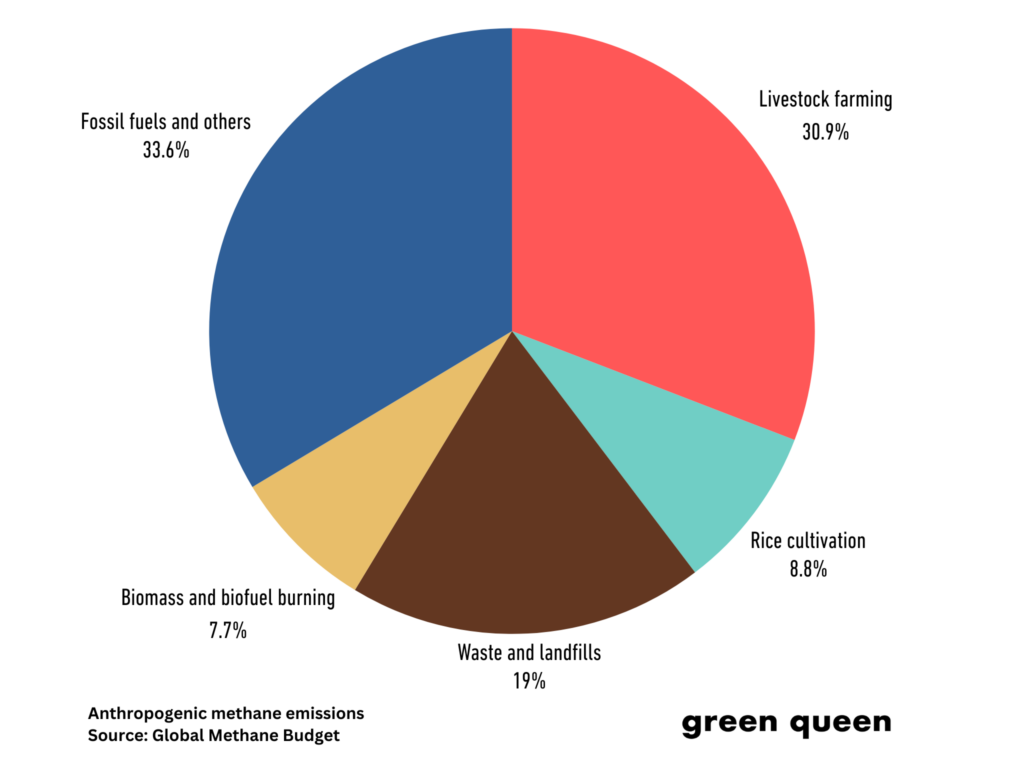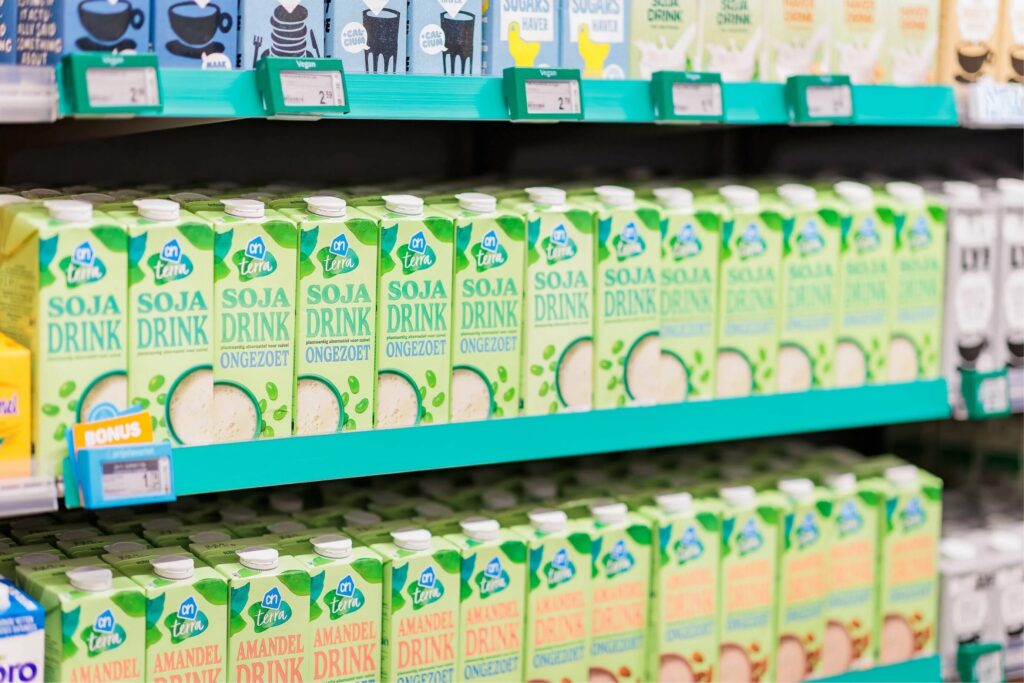
The Netherlands’ largest supermarket, Albert Heijn, has quietly added its methane footprint to its sustainability report, a global first for the retail sector.
As supermarkets respond to calls for better and more tangible sustainability measures, Albert Heijn has become the world’s first retailer to publicly disclose its methane emissions.
Owned by Ahold Delhaize, the Dutch retail giant has made a “discreet update to its sustainability report” for 2024 to add methane’s contribution to its scope 3 emissions, according to environmental non-profit Mighty Earth.
“It is estimated that approximately 14% of these emissions can be attributed to methane, based on secondary data and a percentage approach of methane emissions from agriculture and waste processing,” the report now states.
Mighty Earth hailed the move as a “breakthrough for climate transparency”, with its Netherlands director Jurjen de Waal noting: “For too long, retailers have been telling us that it’s too difficult to disclose methane emissions and yet this move by Albert Heijn shows that it’s clearly not that hard and it can be done.”

Albert Heijn aims to make the animal supply chain more sustainable
Albert Heijn’s sustainability report showed that its scope 3 emissions from purchased products amounted to nearly 8,900 kt of CO2e, a 17.3% increase from 2018. These indirect emissions – stemming from across their value chains, like agriculture, food processing, waste, and transport upstream – make up about 93% of supermarket emissions globally.
The Dutch retailer’s climate footprint was under the spotlight in a report published by Mighty Earth and the Changing Markets Foundation this April. Titled ‘Taking the Bull by the Horns’, the analysis found that Ahold Delhaize’s total methane emissions footprint rivals that of an entire country, like Sweden or Denmark.
It further estimated that methane was responsible for 44% of its scope 3 emissions in 2023 within the forest, land use and agriculture category. The biggest culprits were the group’s US subsidiaries, namely Food Lion, Giant Food, The Giant Company, Hannaford, and Stop & Shop, which accounted for 45% of its methane emissions from meat and dairy. Its Dutch operations, led by Albert Heijn, contributed a furher 24% to this footprint.

Methane is 86 times more potent than CO2 over a 20-year period, and is the primary contributor to the formation of ground-level ozone, a greenhouse gas linked to a million premature deaths every year. Agriculture is the main source of human-caused methane emissions, with livestock farming responsible for the majority of this share. Meat and dairy alone are responsible for a third of retailers’ emissions.
Albert Heijn, which aims to reach net-zero scope 3 emissions by 2050, recognises this. “When manure decomposes, it generates methane and nitrous oxide, both greenhouse gases with high warming potential. Manure is thus a major source of emissions in our animal chains. The natural decomposition process and the high cost of dehydration techniques mean making manure sustainable is very challenging,” it states in its report.
However, it adds: “By using innovations in manure storage and processing, we reduce emissions and make our animal supply chains more sustainable.”
Speaking to Dutch publication Nieuwe Oogst, Albert Heijn spokesperson Pauline van den Brandhof said: “We are prioritising reducing emissions in methane-intensive supply chains, particularly those associated with animal products. Our goal is a 45% reduction by 2030 compared to 2018 and net zero by 2050.”
She added that the company had developed an integrated approach with its suppliers around four themes, including manure and animal feed.
Plant protein split targets must extend to the US market

The methane disclosure builds on Albert Heijn’s other efforts to make its supply chain more planet-friendly. Its parent company is one of several supermarkets that have set a ‘protein split’ target, aiming to raise the share of plant proteins sold to 47% in 2024, 50% in 2025, and 60% by the end of the decade. It has also rolled out the most extensive range of blended meat and dairy products globally, in an effort to cut its climate footprint.
However, Ahold Delhaize has since admitted that sales of plant-based food at Albert Heijn have been disappointing. Despite its target, the ratio of proteins sold failed to increase in favour of plants last year, instead falling slightly from 44.5% in 2023 to 44.2%.
Still, environmentalists have applauded the move, noting how action is more important than disclosure. “While not the only solution, shifting towards plant-based diets is one of the most effective measures to reduce greenhouse gas emissions, especially agricultural methane, to protect climate and nature,” said de Waal.
But the campaign group says Ahold Delhaize’s efforts don’t go far enough. “Although a breakthrough, the same level of commitment needs to [be carried] across the pond to Alhold Delaize’s US operations, which our analysis found account for almost half of the group’s total global emissions,” he said. “Without urgent action from its US brands, Ahold Delhaize is risking its climate goals.”

Mighty Earth founder and CEO Glenn Hurowitz said: “Shifting to plant-based and other alternative proteins is the single biggest step, along with ending deforestation for meat, that companies can take to reduce their climate footprint.” Further, he stressed that Ahold Delhaize must extend the plant protein target for 2030 to the US, where it is the largest retailer on the East Coast.
German retailers Lidl and Rewe Group have both set protein split goals, while in the UK, an alliance of over 200 organisations have urged the government and retailers to take a joint initiative to make reporting of healthy food sales mandatory to include protein sales disclosure too.
Mighty Earth, whose research found that none of the top 20 supermarkets globally had methane targets before Albert Heijn’s announcement, is now calling on other major supermarkets – including Tesco, Carrefour and Lidl – to follow suit.
“Cutting methane emissions is one of the fastest and most cost-effective ways of curbing global heating, and transparent methane reporting is the first step towards tackling the issue head-on,” said de Waal.
The post Netherlands’ Albert Heijn Becomes First Supermarket Globally to Report Methane Emissions appeared first on Green Queen.
This post was originally published on Green Queen.